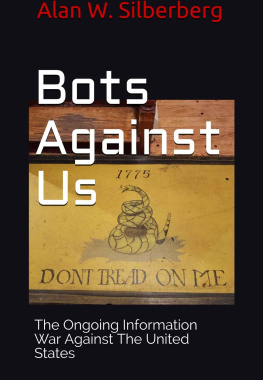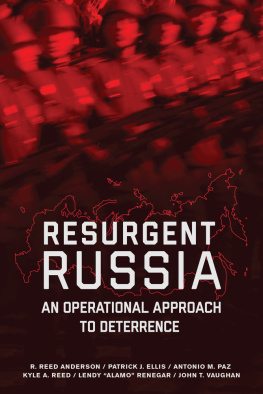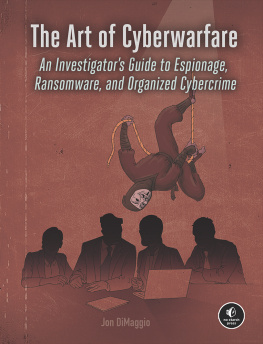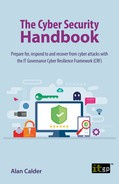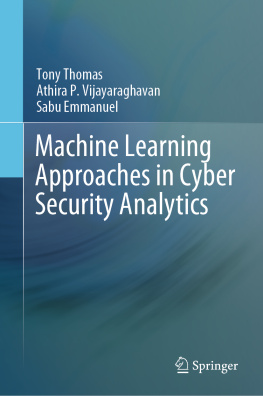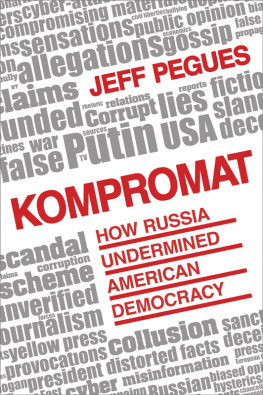Bots Against Us
The Ongoing Information War Against
the United States of America
By
Alan W. Silberberg
Copyright 2019 Alan W. Silberberg All Rights Reserved
Silpress 1st Edition 2019
I would like to thank my parents, my brother, my sons, Sharon, Adrienne, Lovisa, and everyone who pushed me to write this and who put up with my incessant yammering about the Rusher thing. A special note of thanks to Ruth Greenwood, who patiently edited my writing.
The release of the Mueller Report came at the very end of my writing this, so I have only included cursory mentions, plus links and some of the summaries.
The Mueller Report and this book, which I started writing in early 2018, eerily match up.
May 15, 2019 Kindle Version
August 5, 2019 Paperback Edition
Author Biography for Alan W. Silberberg
Alan is a cyber security expert, founder of a cyber security company, and an advisor to two others. The expertise of his company revolves around defending against socially engineered attacks. He served on the California Governors CyberSecurity Task Force from 2014 to 2019.
He was the subject matter expert to the US. Small Business Administration for cybersecurity and rewrote the Cybersecurity for Small Business training program currently found on their website.
He is a former White House staff person under President Clinton and a former member of the JFK Task Force at the US National Archives. Alan was also an executive at Paramount Pictures, handling government relations.
He has spoken about cyber issues on four continents. He spoke at the US Holocaust Museum and Memorial about the dangers of social media being used for propaganda and has written dozens of articles about weaponized information.
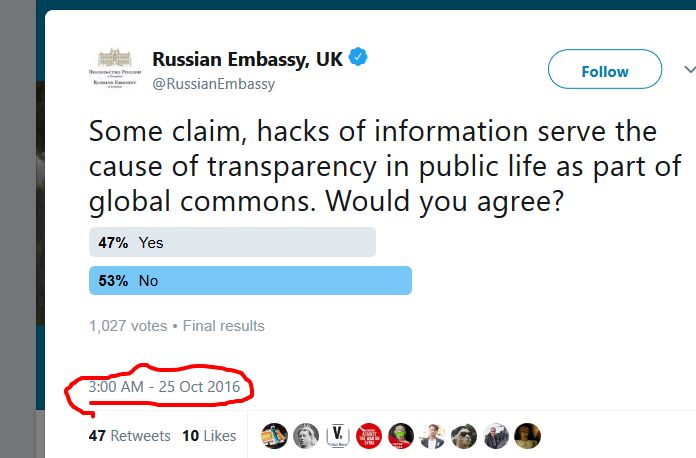
More on this later in the book:
This is a tweet posted by the Russian Embassy, London, October 25, 2016. The original version contained my name and 5 others tagged in the bottom of this tweet. The tags on Twitter in this tweet have since been removed by the Russians.
Introduction
We were attacked by Russia in 2016 on multiple levels.
All of us.
Not just Democrats.
Cyber warfare. It focused on multiple levels of information, politics, and technologyall to psyche us out. Information warfare that dropped a massive bomb on us.
Your house did not get blown up, but your rights, your free country and your democracy just did. For sure.
It happened on many platforms, in many states and at many technological levels. It is not just one hack, but rather a group of hacks, information warfare efforts, and propagandistic manipulation of the media.
It is vitally important to remember how many people were actually indicted by Robert Mueller. At least 34. (So far, that the public knows about in 2019.)
Thirty-four people. Guess how many are directly relevant to this story you are about to read?
At least 12. The twelve Russians indicted are/were GRU (English version of the Russian acronym , which means Main Intelligence Directorate. The GRU is Russia's largest foreign intelligence agency) agents of the Russian Government.
GRU is one of their military intelligence agencies. Add Konstantin Kilimnik, who is known to be a close associate of Vladimir Putin.
Also, it is vitally important to remember that the Democratic National Committee sued the Russian government over the 2015/2016 hacks.
In this ongoing US federal lawsuit, the Russians have tried to defend themselves by suggesting that if such a hack were done by them, it would have been done by the GRU, which is a military organization. This means it would be covered under Sovereign Immunity and thus could not be sued. See this group of tweets and links.
A little backstory:
As one of the few people in 2009 who caught Iran using weaponized media (Twitter) to push propaganda during the so-called Green Revolution, I found it extremely disconcerting to see a highly evolved and much more methodical approach being used by Russia now, six or seven years later, against the US.
During the Green Revolution of 2009, I was so deeply immersed in calling out Iranian propaganda that I was successful in getting over 400 accounts run by Iranian Intelligence agents taken off Twitter. This led to me being invited to give a talk to the United States Holocaust Museum and Memorial in Washington, DC at the end of 2009 about the dangerous uses of social media in propagating propaganda.
So when I started seeing Russian Twitter accounts looking very similar, I paid apt attention. Especially when these Russian accounts started attacking US politicians, US political entities and US individual people.
As a cyber-security and weaponized information expert, and a former White House staff member, what happened to the United States during the 2016 Presidential Election was a severe shock to me personally.
I know this to be true for many in the United States.
My background is that I was fortunate to be able to work for President Clinton in the White House and as a traveling advance aide. I have worked for two US Senators, the US National Archives and a Governor.
I know politics and know cyber security deeply, and started and run a cyber security company, Digijaks. I have been a cyber advisor to US Federal agencies, large corporations, and many politicians and Hollywood celebrities.
This experience, combined with doing presidential and vice-presidential advance as an on-call advance person, taught me much about international relations, as well as the dangers of espionage and attempted espionage from abroad. Especially from hostile foreign nations.
When I worked in the Clinton White House and later as an on-call advance aide, the constant warnings by the consummate professionals in the US Secret Service and the White House Communications Agency were daily. This served as a hard backstop to the news, and the weird people around every trip.
There were constant requests for my phone number and/or email wherever I went as an advance aide. One constant warning when traveling with a president or vice president was to be extra wary of foreigners asking lots of questions or trying to get me to introduce them to key people, or people trying to connect me to foreigners.
Chapter 1
Fast forward to the present, 2019
So why was it such a shock that Trump won instead of Hillary? Especially by such narrow margins in only a few states that mattered for the electoral college. The margins were so thin as to be questionable on their own, and, in fact, this has raised concern about vote hacking or other manipulation of election systems in those states.
There is much speculation about the same type of low margin win in three states, each with almost exactly the same statistical spread, which is extremely improbable in US elections. (That is probably stuff for another book. If you want to examine this issue more carefully, please look at this article from 2019 by 538, the political polling company. https://fivethirtyeight.com/features/how-much-did-russian-interference-affect-the-2016-election/ . )
There are still more questions than answers about these razor-thin margins.
Also see this deeply detailed report by the American Association for Public Opinion Research, which goes into depth about the same questions. https://www.politico.com/f/?id=0000015b-d46e-da30-a3db-fefe45b50002 .
I was not just upset that Trump won because I am a registered Democrat who worked for President Clinton at one time.
No.
It wasnt because of my previous experience. Something more immediate concerned me about Trumps win.
The cyber world has taught me many lessons, but Lesson Number One? When a pattern is not right, it is almost always indicative of something more serious going on. There are few exceptions to this learned experience.
Next page
